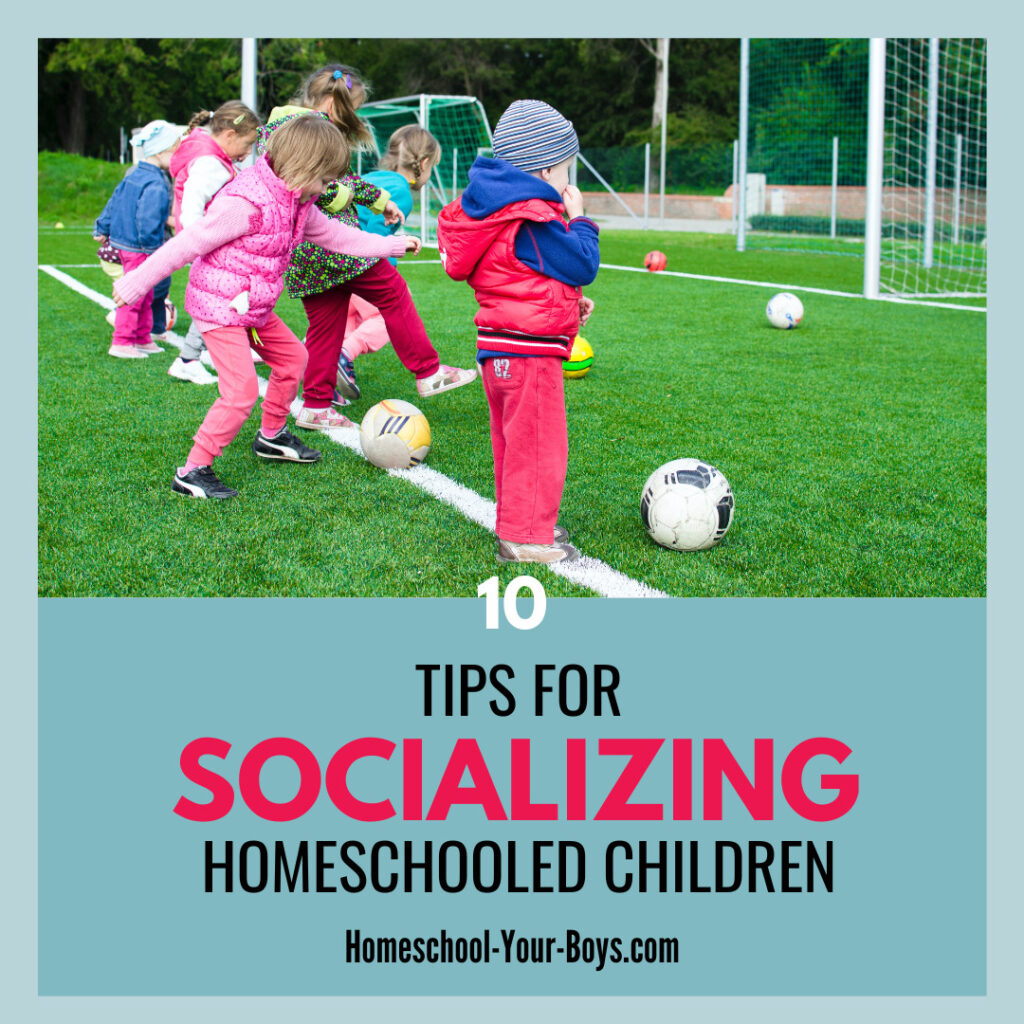One of the big fears that new homeschool families have is that their children won’t be properly socialized. Probably because the question we hear most often when we announce our decision to bring our children home is how we will socialize them.
Actually, it’s virtually impossible NOT to socialize your kids. Every single interaction your child has will help them learn language skills, how to deal with their emotions, and the best ways to communicate with people.

The family is the first place where children learn to become a functioning member of a group. They observe our values, our behaviors, and how we handle conflict. This is also the first place they learn how to communicate with others and to have empathy.
The vast majority of children who learn at home connect with a far more diverse set of people than their peers who attend schools. They aren’t sitting in age-segregated classrooms all day long, mixing with the same set of children each day.
Homeschoolers have lots of options for spending time with people of all backgrounds from different age groups and social status. But we have to be more intentional about placing our children in these situations.
Socialization outside of the family doesn’t automatically happen as it would if we sent our kids off to school every day, which is why is can become a concern for some moms. After all, we want to make sure we’re helping our kids reach their full potential.
If this is an area you would like to work on for your children, there are plenty of ways you can help your kids connect with others.
Here are 10 Tips for Socializing Homeschooled Children:
1 – Church
There are so many opportunities to spend time with peer groups and different age groups via your local church. Get your kids plugged into youth group, Sunday School, summer camp, and at least some of various other activities and they will make lots of friends of all ages in this environment.
2 – Join Homeschool Groups
Look for homeschool groups in your area and join them. These groups provide a great opportunity for children to meet and communicate with other homeschooled children. They often organize group activities, field trips, and playdates.
If you can’t find a group in your area, then make one yourself. I organized monthly field trips with several homeschool families and we had a wonderful time hanging out together and experiencing new things.
3 – Take part in Extracurricular Activities
Look for extracurricular activities that your child is interested in, such as sports, music, art, or dance. These activities can provide a chance for your child to get together with peers who share their interests.
Sports were HUGE for my sons. They enjoyed playing basketball and baseball through homeschool leagues and the YMCA. They were also boy scouts for several years.
4 – Volunteer
Look for volunteer opportunities in your community that align with your child’s interests. Volunteering can provide a chance for your child to gather with people of different ages and backgrounds.
Nursing homes are often eager to have healthy children come interact with the residents. Be sure to call ahead and ask as some facilities are unable to have has many visitors post-Covid. Animal shelters are often looking for volunteers as well!
5 – Attend Community Events
Look for community events, such as festivals, fairs, and parades, where your child can talk to other children and families. Try to attend events that will allow for the kids to mingle with each other.
6 – Online Communities
Use online communities, such as social media or online forums, to connect with other homeschooling families in your area. These communities can provide a chance for your child to meet other children and for you to network with other parents.
This is one of the positive things about social media, so be sure to use it to your advantage.
7 – Library Programs
Check your local library for programs and events for children. These programs often provide an opportunity for children to mix and engage in group activities.
8 – Co-op Classes
Join a homeschool co-op that offers classes or workshops. This can provide an opportunity for your child to learn and meet with other homeschoolers. The moms of the attendees often run them with the parents taking turns teaching and they can be as intense or as laid back as the families would like them to be.
We were part of a co-op for several years where the kids took part in classes that were enhanced by doing them with a group such as gym, film class, science labs, theater, cooking, etc.
9 – Parks and Playgrounds
If you have younger kids, try taking them to different parks in your area and letting them play. It’s amazing how quickly they will make friends with other children and have a wonderful time. Learning to approach and talk to children they don’t know is a wonderful skill for them to gain.
Obviously, you have to be watchful to make sure there isn’t an adult at the park will bad intentions. But in my experience, the moms all look out for the other kids and communicate quickly if there is someone suspicious to be mindful of. Listen to your gut on this one!
10 – Neighborhood Children
We can easily overlook this one, but spending time with other kids in the neighborhood is also a great way to interact with others.
Remember that socialization shouldn’t just happen between children the same age as yours. One of the lovely things about homeschool co-ops and other groups is that kids can mingle with children who are older and younger than they are.
This is a much more natural way of socializing than being stuck all day in a classroom with kids who are all the same age.
As you can see, homeschooled children have lots of opportunities to socialize. With a bit of planning, parents can incorporate some of these tactics into their school year with the confidence that their children will become well adjusted members of society.



The article offers a refreshing and insightful perspective on the topic of socializing homeschooled children. It not only addresses common misconceptions but also provides practical strategies for parents to ensure their children’s social development. I appreciate how the article emphasizes the importance of diverse social interactions and highlights the opportunities homeschooling can provide in this regard. By promoting community involvement, extracurricular activities, and intentional networking, the article showcases a holistic approach to nurturing well-rounded and socially adept homeschooled children. It’s an empowering read for parents seeking to create a positive and engaging social environment for their children within the homeschooling context.